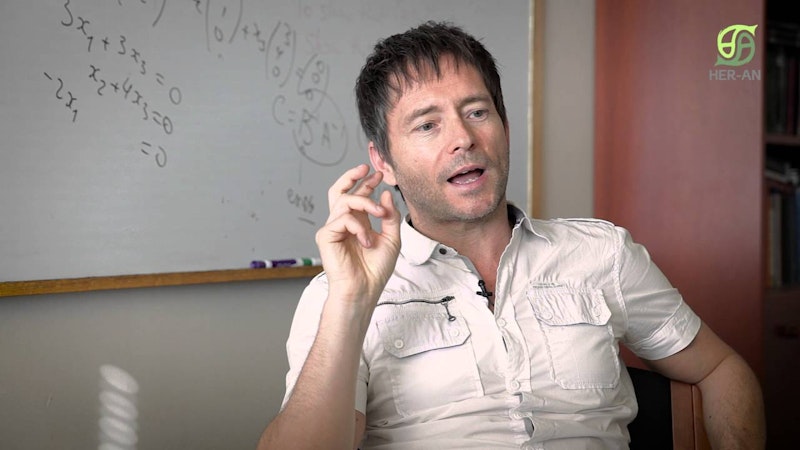A few months ago, I attended a party for George Musser’s book Putting Ourselves Back in the Equation, which I’d written about for Splice Today. Speaking to the attendees, George pointed out several who’d influenced his research into mysteries of mind and matter. One was philosopher David Chalmers, noted for formulating the “hard problem of consciousness.” I then looked for where the alcohol was stored, and asked Chalmers, who was passing by. He didn’t know. I wisecracked that he knew about things like the “mind-body problem,” and Chalmers cheerfully agreed he hadn’t resolved the “booze problem.”
Over the holidays, I again mixed booze with esoterica, sipping chilled eggnog as I contemplated free will and consciousness, subjects I’ve considered intermittently since my youth. The latest mulling began with an article in the scientific journal Nature by philosopher Eddy Keming Chen titled “Does quantum theory imply the entire Universe is preordained?” Though quantum physics is often interpreted as having an indeterministic element, showing the future’s not fixed (which some have built upon to make arguments for free will), Chen argued it may instead point toward a “strong determinism,” in which everything that happens is an unavoidable consequence of physical law, fixed for eternity.
Knowing this claim would interest (in a negative way) science writer John Horgan, whom I’d spoken with at Musser’s party and at an event involving Horgan’s ventures into the quantum realm, I tweeted the Chen piece to Horgan. I then saw a video about free will and related topics by mathematician Edward Frenkel, whose works I’ve written about, and so looped him in as well. Frenkel first got into math through an interest in quantum physics, and his research includes explorations of the quantum relevance of the Langlands program, an effort to uncover hidden connections among diverse areas of math.
Neither Frenkel nor Horgan were impressed by the idea of a deterministic quantum universe, Horgan seeing it as reminiscent of “superdeterminism,” a controversial claim that there’s an underlying correlation between seemingly independent experimental events; and Frenkel contending that quantum field theory, in which quantum mechanics is extended from particles into fields, and which unlike the original quantum theory is compatible with special relativity, has indeterministic implications. I’m struck that general relativity, which has long been seen as a deterministic theory, might also point toward a universe without a fixed future, as suggested in an approach by physicist Jonathan Oppenheim.
Frenkel has changed his philosophical outlook in recent years, absorbing some influences that might be described as “New Age” or “mystical” while maintaining his interests in math and physics. He’s become receptive to the idea of “non-duality,” which sees an underlying wholeness to reality rather than a separation between observer and observed. He speaks movingly about how an early experience—in which he was barred from a math program as a teenager in the Soviet Union because his ancestry’s partly Jewish—was more traumatic than he’d realized, and that this and other traumas left him closed off to what Blaise Pascal referred to as reasons of the heart, of which reason knows nothing.
Frenkel uses an intriguing analogy to counter claims, such as those of physicist Brian Greene, that humans, along with everything else, are “collections of particles.” Particles, in Frenkel’s telling, should be thought of as like ice cubes, temporary and approximate, the separations between them are not inherent but just a result of conditions, as with those of an ice tray. Thinking of ourselves in terms of particles, or neurons in our brains, or sequences of zeroes and ones like a computer program, is damaging, in Frenkel’s view, disconnecting us from nature and other people, getting us to think of ourselves as cogs in a machine and to behave accordingly; moreover, he says, such a mechanistic world-view is incorrectly presented as established by science.
On Christmas, exchanging gifts with my family, I received whiskey stones from my in-laws. These are little sandstone spheres that serve as substitutes for ice cubes; you store them in the freezer, and they stay cold for some time afterward. I haven’t yet tried them but look forward to putting them in single malt whiskey. The idea that a single malt should never be chilled is, to my mind, an example of how expert opinion can be wrong; of how we humans have much to learn on matters large and small.
—Follow Kenneth Silber on Threads: @kennethsilber

